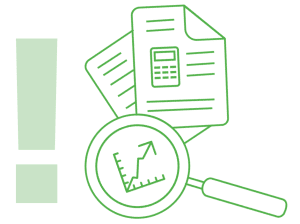As Przemysław POWIERZA, Tax Partner at RSM Poland, mentioned in an interview with "Dziennik Gazeta Prawna" - a nationwide legal and economic daily, disputes with the Polish tax office do not always mean trouble, and sometimes they are even necessary for the company to feel safer and minimize tax risks. However, what should entrepreneurs who decide to use the help of an advisor and enter into a dispute with the National Revenue Administration expect? We invite you to read the second part of the interview with our expert.
Let's move on to discussing what such a dispute looks like, what are the subsequent phases. As you said, it often starts with an innocent phone call asking for clarification. We already know that we should ask for a letter...
If we demand a summons, we usually get them. In the case of matters of minor importance, the most common method of contact is e-mail. It is worth remembering that e-mail is not a formal procedure for exchanging information with the tax authority, although if it is a trifle, you can stop at this e-mail. However, in accordance with the established procedure, we should receive a written summons by mail or via the e-PUAP platform, which is the official channel of communication with the public administration. Thanks to this, we are later able to determine exactly when this exchange of information took place.
We exchange information in the course of verification activities, during which doubts may arise on the part of the tax authority - and then it should also be taken into account that in the future it may result in a tax audit. Tax audit is a more formalized mode of information exchange, with a defined beginning, end, and scope of the audit.
It is worth emphasizing here that in this mode, the inspection authority initiates a number of activities, which also limits the taxpayer's active participation in the inspection - but this does not mean that he should "sit quietly on the sidelines". On the contrary, it is always worth taking the opportunity to add your comments to the actions taken by the authority and ensure that the documentation of the proceedings includes as much information about your business as possible. Such explanations and comments of the taxpayer may turn out to be extremely important if it comes to the next stage, i.e. tax proceedings. This is the stage when discrepancies in the assessment of the situation between the taxpayer and the tax authority may lead to a meeting in court - that is, to the last possible stage of the dispute.
To sum up, a dispute can start very early and develop very differently - we are not able to predict it. However, where we can do something, we should be very active and ensure that our opinion is not lost in the flood of data and documents processed by The National Revenue Administration officials.
Therefore, we can say that we have several options for "meetings with the tax office": first we can receive a request for clarification, and the next step is a tax audit - and here a serious dispute may arise. There is also such a thing as customs and tax control, which applies to virtually all entrepreneurs, although few have encountered it.
Customs and tax control works in parallel to the stages we talked about above. In fact, until now it was believed that this procedure was intended for particularly dubious cases - such as tracking crimes related to tax settlements.
At the moment, the controllers also use this procedure in complex cases, such as, for example, verifying the correctness of transfer pricing.
In many respects, customs and tax audits are similar to tax audits. And although this means that the initiative is on the side of the tax authorities, the entrepreneur should use every opportunity to add his comments and justifications. Let me emphasize once again: bearing in mind that any dispute may end up in court, you must ensure that the documents contain as much information as possible from the perspective of the person running the business from the very beginning. Let us remember that Polish taxes today are not just a simple tax rate related to a certain tax base - they are sometimes monstrous costs of calculating these taxes and then handling them and some long-term disputes related to them, sometimes additionally complicated by the fact that at the beginning no one took care of risk assessment and appropriate safeguards.
Learn more about resolving disputes with tax authorities
Are Polish entrepreneurs willing to go to court? Which attitude is more common: "I know the rules and I'm sure I'm right" or rather "I won't fight the tax office, I'll give up and pay"?
I will answer like every practitioner - it depends on the impact of the dispute on the business. I call it "repetition". If the difference of opinion between officials and the entrepreneur concerns a single topic, the approach entitled "Let's limit the scale of this dispute and the costs" prevails. In such situations, entrepreneurs are willing to let go of some things in order to close the case as soon as possible.
The situation is different in the case of topics that may be repeated - or those that may, for example, lead to serious suspicion of a given company. The consequences of a conciliatory attitude in such situations may significantly affect the condition of the business. And my observations show that in such situations, entrepreneurs "enter the ring".
Let us remember, however, that each time the decision is business-related and depends on individual conditions. Nevertheless, if I were to make a general assessment, our entrepreneurs are rather not afraid to enter into a dispute and bring it to an end. The reluctance to start a discussion with the tax office usually takes place at the beginning, with these innocent checks. Once they know that the dispute is getting "serious", they try to take advantage of all the possibilities offered by tax law procedures.
Let's move on to the last stage: a hard dispute in court. Are Polish courts well prepared for such "business" administrative cases? After all, you need to know about the realities of running a business to make the right judgment.
I will answer diplomatically: the level of preparation in administrative courts, especially those of the first instance (voivodeship), is ... different. I will not reveal a secret here if I say that today, as tax advisors, we are able to tell exactly which courts in a given topic are good and which are doing worse.
However, today the courts are faced with a huge challenge - in the face of poor quality of tax law, they take on the burden of responsibility already at the last stage of the taxpayer's dispute with the tax office. In order to rule fairly, i.e. in accordance with the letter of the law, it is necessary first of all to understand the taxpayer's business well (and let me stress it again: the court has a better chance to understand our business well if, thanks to our previous activities, more of our business can be found in the case files).
Let us remember that proceedings before the administrative court do not allow for the calling of witnesses, and there is not much to say or explain at the hearing – it is a very formalized and short procedure. The court forms an opinion about us based on what it finds in the proverbial "document box" prepared during the tax audit. That is why it is so important for the taxpayer to take care of the appropriate number of his comments and business description in advance - this increases the chances that the judge will understand our case well and rule in our favour.
Therefore, there is no need to be afraid of disputes, and you need to be prepared to conduct a dispute well, because it helps to run a business well. So that the regulations, which are not always clear and legible, are interpreted in favor of our company.
In conclusion, as a summary of the conversation, I would put forward the following thesis: today, a well-run business is one that provides time for constant conversation with the tax office, and not avoiding this conversation - sometimes also confrontation - in the well-understood sense of the word, i.e. information in order to know where I may need to supplement my knowledge. This is, in my opinion, an important element of the strategy for tax security today.





